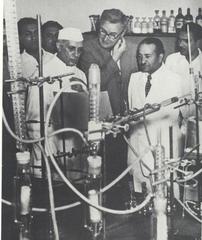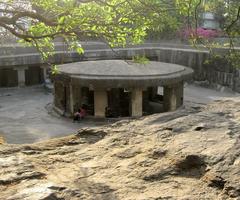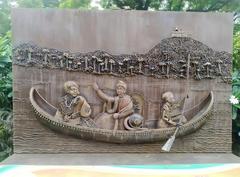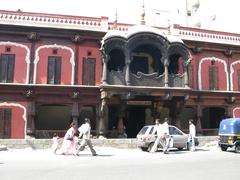Chaturshringi Temple Pune: Visiting Hours, Tickets, Architecture, and Travel Guide
Date: 03/07/2025
Introduction
Perched atop a majestic hill with four distinct peaks along Pune’s Senapati Bapat Road, the Chaturshringi Temple stands as a vibrant symbol of Maharashtra’s spiritual heritage, architectural excellence, and living cultural traditions. Dedicated to Goddess Chaturshringi (also called Ambareshwari or Mahakali), this iconic temple draws thousands of devotees and tourists annually. Its origins are deeply rooted in Maratha history, especially the era of the Peshwas, and the unwavering devotion of Durlabhsheth Pitambardas Mahajan, who established this sacred site following divine guidance.
Chaturshringi Temple’s name, derived from “Chatur” (four) and “Shringi” (peaks), reflects both its dramatic location and the metaphorical reach of the Goddess’s power. The temple’s impressive architecture, panoramic views, and vibrant festivals—especially Navratri—make it a must-visit destination for spiritual seekers and culture enthusiasts. This comprehensive guide explores the temple’s history, architecture, religious significance, practical visitor information, travel tips, nearby attractions, and more, ensuring you make the most of your visit. For additional details, consult resources such as Pune Tourism, TemplePurohit, and Myoksha.
Table of Contents
- Introduction
- Historical Background and Founding Legend
- Etymology and Symbolism
- Architectural Features
- Religious and Cultural Significance
- Visiting Hours, Tickets & Accessibility
- Location & How to Reach
- Facilities and Visitor Amenities
- Travel Tips
- Festivals and Rituals
- Nearby Attractions
- Frequently Asked Questions (FAQs)
- Conclusion and Final Tips
- References
Historical Background and Founding Legend
The Chaturshringi Temple dates back to the era of the Maratha Empire, notably during the reign of Chhatrapati Shivaji Maharaj and the Peshwas. According to legend, Durlabhsheth Pitambardas Mahajan, a devout merchant and Peshwa associate, would journey to the distant Saptashrungi Mata temple in Nashik every full moon. As age made the pilgrimage difficult, the Goddess appeared to him in a dream, instructing him to find her idol in the mountains northwest of Pune. Guided by this vision, Durlabhsheth discovered the self-manifested (swayambhu) idol and established the Chaturshringi Temple, which has since become a spiritual beacon for Pune (TemplePurohit; Myoksha).
Etymology and Symbolism
“Chaturshringi” fuses “Chatur” (four) and “Shringi” (peaks or horns), referencing the four prominent peaks of the hill on which the temple stands. These peaks represent the Goddess’s cosmic reach in all directions and the spiritual ascent of the devotee. The temple’s dimensions—approximately 90 feet high and 125 feet wide—underscore its monumental presence as a center of faith for Maharashtra (Myoksha).
Architectural Features
Style and Layout
The temple exemplifies West Indian Hindu temple architecture, harmoniously blending with the rugged hillscape. Its classic design features a soaring shikhara (spire) above the garbhagriha (sanctum), and an expansive mandapa (pillared hall) for congregational worship (OmAstrology). Locally sourced stone and thoughtful landscaping ensure the structure integrates seamlessly with its natural surroundings.
Main Shrine
At the summit, the main sanctum houses the swayambhu idol of Goddess Chaturshringi. The sanctum is simply adorned to focus attention on the deity, but is elaborately decorated during festivals like Navratri (Tripoto).
Subsidiary Shrines
- Ganesh and Ashtavinayaka: The complex includes shrines to Lord Ganesh, with eight miniature Ashtavinayaka idols placed on surrounding hillocks, enabling devotees to undertake a symbolic pilgrimage within the temple grounds.
- Other Deities: Shrines to Durga, Lakshmi, Saraswati, and Kali emphasize the temple’s inclusive worship of the divine feminine (Praveen Musafir).
Physical Layout and Climb
Visitors ascend over 100 steps (some sources cite up to 200) to reach the main sanctum. The steps are broad, equipped with railings and resting spots, and lined with gardens and shaded areas for a comfortable climb (Pune Tourism; CEMCA).
Decorative Elements
The temple’s architecture is adorned with intricate sculptures, motifs of gods and goddesses, and floral designs. During festivals, the entire complex is illuminated and decorated with flowers and lamps, creating a vibrant devotional atmosphere (OmAstrology).
Religious and Cultural Significance
Chaturshringi Temple is a focal point for worship, particularly during Navratri, when thousands of devotees participate in special rituals and processions. The temple’s daily practices include traditional pujas, aartis, and offerings. Its inclusive approach, with shrines to multiple deities, reflects the syncretic tradition of Maharashtra. The temple also functions as a hub for community and charitable events, reinforcing its role in Pune’s social fabric (7th Traveler).
Visiting Hours, Tickets & Accessibility
- Visiting Hours: Timings vary slightly by source:
- Common timings: 5:00 AM to 10:00 PM (Pune Tourism)
- Some sources: 6:00 AM to 9:00 PM or 9:00 AM to 9:30 PM (E India Tourism)
- During major festivals like Navratri, extended hours may apply.
- Entry Fee: Free for all visitors; donations are welcome.
- Photography: Not permitted inside the sanctum to preserve sanctity. External photography may be allowed; please follow posted guidelines.
- Accessibility: The stair climb may be challenging for elderly or differently-abled visitors. There are resting spots, shaded areas, and drinking water stations to assist with the ascent, but wheelchair access is limited.
Location & How to Reach
- Address: Senapati Bapat Road, Pune, Maharashtra.
- Distance from Pune Railway Station: Approximately 6–7 km.
- Distance from Pune Airport: About 10–12 km.
- By Road: Easily accessible via taxi, auto-rickshaw, or city buses. Ample parking is available at the base but can fill quickly during festivals (Trawell.in).
- By Public Transport: City buses and auto-rickshaws frequently serve the temple area.
Facilities and Visitor Amenities
- Shops and Stalls: Offer puja items, flowers, coconuts, and snacks.
- Restrooms: Basic facilities are available near the base.
- Resting Spots: Benches and shaded areas are located along the ascent.
- Drinking Water: Provided at intervals.
- Security: Staff and volunteers are present, especially during major events.
- Dharamshalas: Pilgrim guest houses are available for overnight stays during festivals (Pune Tourism).
Travel Tips
- Visit early morning or late evening for cooler temperatures and fewer crowds.
- Wear comfortable shoes suitable for climbing stairs.
- Carry water and consider light refreshments, especially in warmer months.
- Dress modestly and remove footwear before entering the main temple.
- Avoid visiting during heavy rains, as steps may be slippery.
- Respect temple customs and follow instructions from staff, especially during festivals.
Festivals and Rituals
- Navratri: The most significant festival at Chaturshringi Temple, featuring grand processions, cultural programs, and elaborate decorations. The tenth day (Vijaya Dashami) includes a silver chariot procession (Praveen Musafir).
- Other Festivals: Chaitra Poornima, Ganesh Chaturthi, and Durga Ashtami are also celebrated.
- Daily Worship: Includes regular aartis, pujas, and special offerings.
Nearby Attractions
- Shaniwar Wada: Historic fortification and seat of the Peshwas.
- Dagdusheth Halwai Ganapati Temple: Renowned Ganesh temple in Pune.
- Parvati Hill Temple: Another scenic hilltop temple in Pune.
- Aga Khan Palace, Raja Dinkar Kelkar Museum, Sarasbaug Ganpati Temple: Other cultural landmarks nearby.
Frequently Asked Questions (FAQs)
Q: What are the Chaturshringi Temple visiting hours?
A: The temple is open daily, generally from 5:00 AM to 10:00 PM. Check for special timings during festivals.
Q: Is there an entry fee or ticket required?
A: No, entry is free for all visitors. Donations are accepted.
Q: Is photography allowed in the temple?
A: Photography is not permitted inside the sanctum. It may be allowed in external areas but always follow official guidelines.
Q: How do I reach Chaturshringi Temple from Pune Airport?
A: The temple is 10–12 km from Pune Airport and can be reached by taxi, auto-rickshaw, or city bus.
Q: Is the temple accessible for differently-abled visitors?
A: The temple climb involves stairs and currently lacks ramps or lifts. Assistance may be available during festivals.
Q: Are guided tours available?
A: Regular guided tours are not offered, but local tour operators provide combined packages; special guided activities are held during major festivals.
Conclusion and Final Tips
The Chaturshringi Temple is a luminous beacon of spiritual devotion, architectural heritage, and community life in Pune. Its stunning hilltop location, vibrant festivals, and welcoming atmosphere invite all—devotees, history enthusiasts, and travelers alike—to participate in its living traditions. Prepare for your visit by checking the latest timings, wearing suitable attire, and respecting temple customs. Combine your temple experience with nearby cultural sites for a fulfilling Pune itinerary.
For real-time updates, travel tips, and information on guided tours, consider downloading the Audiala app and following Pune’s tourism channels.
Embark on your spiritual and cultural journey at Chaturshringi Temple and discover the enduring essence of Maharashtra’s heritage.
References
- Chaturshringi Temple Pune: History, Visiting Hours, Tickets & Guide to This Historic Pune Site, TemplePurohit
- Chaturshringi Temple Pune: Visiting Hours, Tickets, and Cultural Significance, Myoksha
- Chaturshringi Temple Pune: Timings and Details, 7th Traveler
- Chaturshringi Temple Pune: Architecture, Visiting Hours, Tickets & Travel Guide, Tripoto
- OmAstrology: Chaturshringi Temple
- Pune Tourism: Chaturshringi Temple
- Praveen Musafir: Chaturshringi Temple
- Trawell.in: Chaturshringi Temple
- E India Tourism: Chaturshrungi Temple Pune




